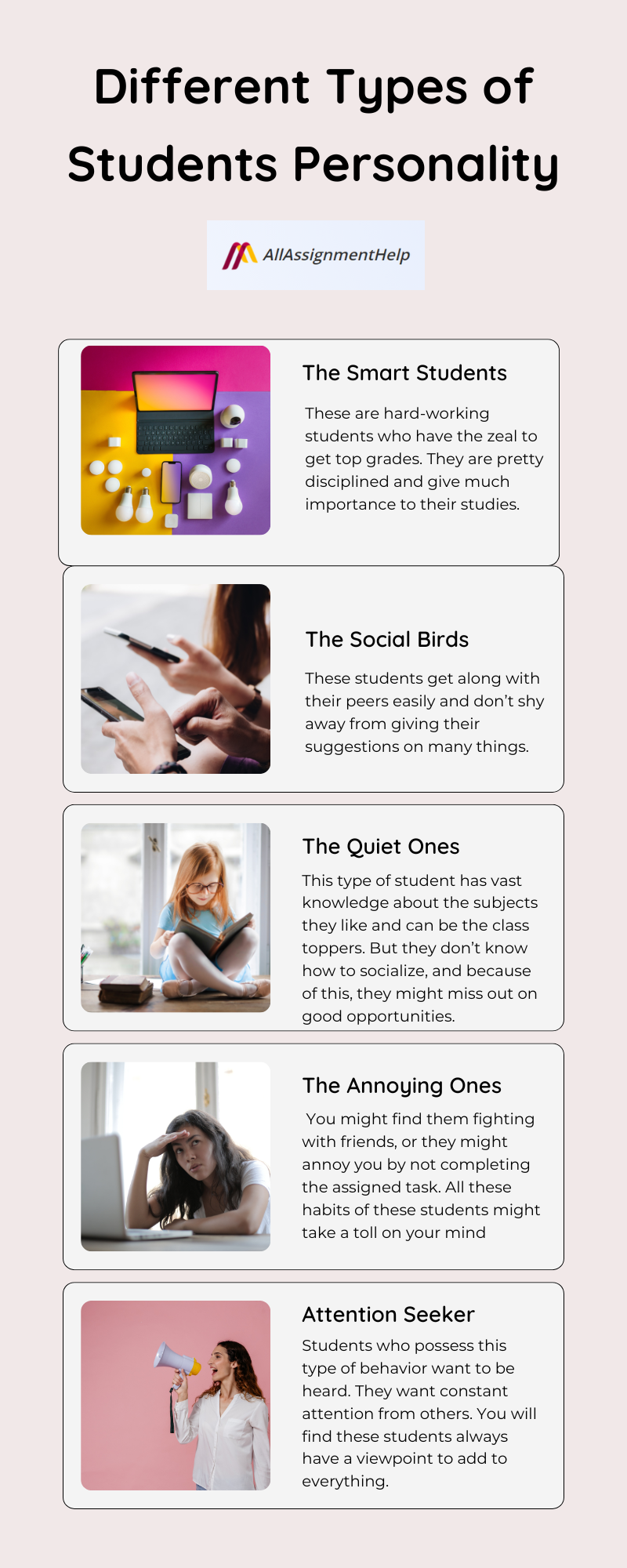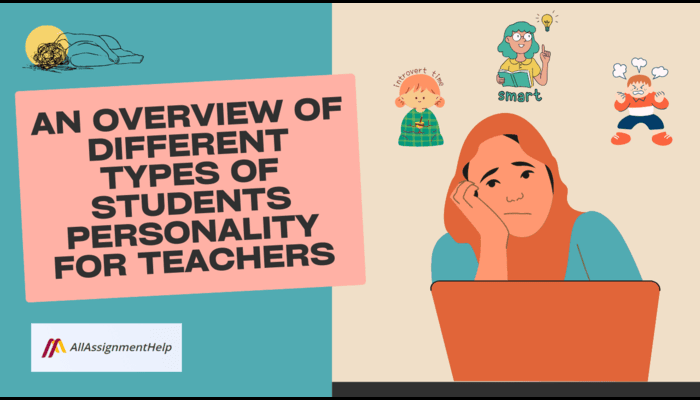Table of Contents
Everybody has a different personality type and set of distinctive traits from birth. However, understanding students personalities and temperaments will enable a teacher to better understand the reasons behind their actions. It might assist them in resolving behavioral problems. With the right strategies, you will learn how to deal with a class of different student personalities.
Have you been in a situation struggling to figure out the behavioral patterns of some students? As a teacher, you might see different types of students, but understanding their personalities is no easy task. We have curated this blog to help those teachers deal with their students. So, keep reading this blog curated by one of the experts of All Assignment Help. We will tell you the different types of student personalities and how you can help them with their academics.
Types of Students Personality
As a teacher, you can find different types of students in the classroom. Each of them has a different ability to work, speak, and perform. In general, there are a few types commonly found in students personality. They are.

The Quiet Ones
The first type of students personality that we will discuss is the quiet ones. There are two categories in these. Some students choose to stay quiet, as it is their nature. It doesn’t simply mean that they are dumb or scared. The other category is the one where they have some hesitation in speaking. They might possess excellent analytical and understanding skills, but they don’t express themselves in class. This type of student has vast knowledge about the subjects they like and can be the class toppers. But they don’t know how to socialize, and because of this, they might miss out on good opportunities.
The Social Birds
You might have heard a quote that goes like “A human is a social bird.” This type of student is a good example of it. They get along with their peers easily and don’t shy away from giving their suggestions on many things. They actively participate in extracurricular activities and are popular on the school or college campus. However, it doesn’t mean that they come to the institute to have fun. They know their responsibilities well. Most of them are good at studies as well and compete well with their classmates.
However, there are also a few students who actively engage in other activities that they miss out on to fulfill their academic responsibilities. Such students often find themselves wondering, is it possible to pay someone to take my online class? If you seek such students, make sure to guide them on the right path. Help them to motivate themselves and balance their responsibilities well.
The Smart Students
You must have noticed that sort of student who raises their hand quickly whenever you put a question in front of the class. These students can be categorized as smart. These are hard-working students who have the zeal to get top grades. They are pretty disciplined and give much importance to their studies. They are the type of students whom you can choose as a class representative.
The Annoying Ones
These type of students are the ones who add spice to your class recipe. You might find them fighting with friends, or they might annoy you by not completing the assigned task. All these habits of these students might take a toll on your mind. Most of the teachers end up scolding such students as they don’t meet their academic responsibilities.
Also Read: Borderline personality disorder – A rare kind of personality disorder
Attention Seeker (Discussion-Dominating Students)
Students who possess this type of behavior want to be heard. They want constant attention from others. You will find these students always have a viewpoint to add to everything. In every discussion, they will show active participation. Moreover, you will find that such students have a dominant attitude. They try to dominate in every type of discussion.
The overactive participation of these students may create an environment that demotivates other students in the class. However, as a teacher, you should try to create a balanced situation in class. Make sure everyone has equal participation in class discussions.
Unprepared Students
Some students develop a tendency to skip lectures, work, or exams. They always remain unprepared for the work. Some of them even raise inquiries such as, can someone take my online test for me to escape from the stress?. Even during the exams, they left with some important topics. Being a teacher, you always want to help all students with academics.
So, if you find such students, then follow some measures. Keep your explanation simple. In the first meeting, tell them your expectations in simple words. You can also conduct activities in the class to help such students develop skills through quizzes and puzzles. If a student is in the habit of lacking preparation, provide some positive reinforcement.
Inattentive Students
Some students are busy in their world. Some thoughts and ideas constantly revolve in their mind. They disturb the class by talking during the lectures. According to McKeachie and Svinicki, students feel inattentive due to the difficulty in understanding the lecture. In complex lectures like finance, students experience this issue even more. They struggle to concentrate in their class, which hampers their assignment submission. Many of them even consider hiring a finance assignment helper as they cannot deal with poor grades.
Find the reason behind the attentiveness of students. Whether there is an issue in your teaching that makes them fail to concentrate. Or are they facing any issues that make it difficult to focus in the classroom? Do not leave such behavior. Try a solution to divert their attention from you.
- Implement some strategies, such as increasing interaction in the class.
- Respond to you and show more engagement in the class.
- Ask questions to help them concentrate.
Despite this, if the behavior persists, you might need to have a one-on-one session with that student in person.
Ways to Improve Students’ Personality
Students show versatile behavior in the classroom. Some types of behavior are normal and can be handled without any additional effort. However, you will see students who are in the habit of creating disruption, disturbance, or staying introverted in class. Such students need extra care and attention.
As a teacher, you will be responsible for handling several students. Every student you encounter may have different behavior. Therefore, it is your responsibility to manage student behavior properly. Here are some tips to help teachers improve students’ personalities.
Discover Students Strengths
Identifying strengths is one of the ways to improve students’ personalities. Most students don’t know their strengths and what they want in their lives. Teachers can help students in this process. You can help them discover their strength, which they may not observe by themselves.
Instill Discipline and Values
Good discipline and values are examples of a good personality. Each student must have honesty, punctuality, cooperation, and respect. Teachers can use reward systems to help them understand the importance of values. They can’t reinforce these immediately. You should try helping them define their character.
Encourage Active Participation
Active participation in the classroom helps in self-awareness, which is the strongest aspect of a student’s personality. However, not all students are confident enough to actively participate in the classroom discussion. Three out of five students are shy, and this is the major reason why they don’t perform well. They want to ask teachers for assignment help, but out of fear or shyness, they don’t dare to.
As a teacher, you can solve this issue easily. This is how you can do this.
- Try using interactive methods in the classroom.
- Incorporate group discussions and ask everyone to participate.
- Ask open-ended questions.
- Avoid criticizing responses.
- Use a tracker to monitor students’ progress.
Also Read: A Detailed Study on the Different Types of Personality
Provide Constructive Feedback
Giving constructive feedback is also a way to shape the behavior and personality of students. Feedback helps them reflect and grow. You should be careful in providing feedback. Your positive feedback can motivate and highlight patterns in their performance. On the other hand, your negative feedback can hamper their learning activity. Provide suggestions and help them accept criticism gracefully
Support Skills Development
Nurturing skills is also a part of developing students personalities. Teachers play a big role in developing students’ character. Help them develop both technical and soft skills, which will make them confident and responsible individuals. Actively help them in skills development, which will solve challenges independently.
Here are a few personality-enhancing skills. which students must have
- Communication skills to help them express themselves clearly
- Critical thinking skills to analyze situations
- Emotional intelligence helps them name their feelings.
- Leadership skills to effectively collaborate on tasks
- Adaptability to bounce back from mistakes
- Time management to help them set deadlines
Teachers play many important roles in students’ lives. They are their instructors who teach them both course lessons and life lessons. As a teacher, your responsibility is not just providing a well-rounded education; it also involves personality development. A student’s personality impacts their confidence and how well they do in their life. It is crucial for success in both personal and professional life. Teachers can play a big role in students personality development. We hope the above-given tips will guide them on this path in shaping the young generation.
Students Personality Quiz Questions
Want to know yourself better? A students personality test is one of the best ways to know how you are as a student. The student quiz is a way to know about your strengths and work on your weaknesses.
Here are some questions to know what type of student you actually are. Be honest while answering to know who you are as a student.
- What is your ideal study environment? (indoor or outdoor)
- What do you prefer at a house party? (Dancing, sports, or just sitting in a corner)
- What is your weekend activity (hanging out, planning a weekend trip, or preparing for your next assignment)?
- Do you stay calm in a pressuring situation or not?
- Do you work in a clean and organized space?
- What job do you prefer? (full-time, part-time, freelancing)
- What style of class presentation can you give? (confident, detailed, entertaining, or inspiring)
Also Read: Master’s Degree vs Professional Experience: What Works For You?
Frequently Asked Questions
Question 1: What are the top qualities of a student?
Answer: Respect, accountability, punctuality, justice, and truth are some of the top qualities of a student.
Question 2: What are the different types of student personality?
Answer: Attention seeker, perfectionist, smart, and people pleaser are some of them.
Question 3: Can teachers help students in personality development?
Answer: Yes, teachers can help in improving students personalities. Identifying strengths is one of the ways to guide them and improve their personalities.
